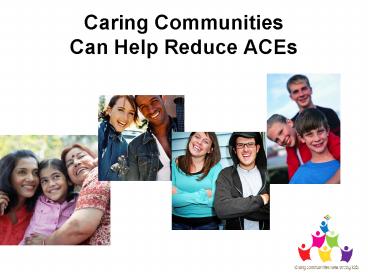Caring Communities Can Help Reduce ACEs - PowerPoint PPT Presentation
Title:
Caring Communities Can Help Reduce ACEs
Description:
Mental Health: A Report of the ... Parenting Skills and Child Development Concrete ... Nurturing and Attachment Observe and Attend to Children ... – PowerPoint PPT presentation
Number of Views:58
Avg rating:3.0/5.0
Title: Caring Communities Can Help Reduce ACEs
1
Caring Communities Can Help Reduce ACEs
2
Mental Health
- Mental health is indispensable to well-being,
relationships, and contribution to the community
or society. - U.S. Department of Health and Human Services.
Mental Health A Report of the Surgeon General,
1999.
3
Safe, Stable, Nurturing Relationships
- are the key to mentally healthy children and
adolescents
4
What is Resilience?
- Good outcomes in spite of serious threats, toxic
stress. - Resilient people
- are prepared to be effective in the world
- can adapt to challenges
- are mentally healthy
5
Resilience is
- Feeling connected to caring family and community
- Self-regulation skills
- Positive view of self
- Motivation to be effective in your environment
6
Protective Factors
- Are conditions that increase health and
well-being for children - Are buffers that provide support and coping
strategies for parents
7
Protective Factors
- Parental Resilience
- Social Connections
- Knowledge of Effective Parenting Skills and Child
Development - Concrete Supports in Time of Need
- Nurturing and Attachment
8
Safe, Stable, Nurturing Relationships
- SAFE free from harm
- STABLE a high degree of consistency
- NURTURING compassionate,
responsive caregiver(s)
9
Concrete Supports in Time of Need
- Food, Shelter, Basic Services Critical to Child
Well-Being - Link Caregivers to Community Resources and
Extended Family - Work on Sustainability
10
Nurturing and Attachment
- Observe and Attend to Children
- Provide Safe and Stable Home Life
- Model Caring Behavior
- Respond to Childs Needs
- Use Positive Discipline
11
Knowledge of Parenting and Child Development
- Create Healthy Parent Child Roles
- Encourage Positive Behavior
- Address Developmental Challenges
12
Social Connections
- Make it Easier to Care for Children
- Provide Support in Crisis
- Create Opportunities to Help Others
13
What Can We Do To Promote Good Beginnings for
Kids?
14
7 Strategies to Build Strong Communities
15
Provide Information
- Raise public awareness
- Display Strong Communities Raise Strong
Kids posters - Hand out Strong Communities Raise Strong
- Kids brochures
16
Enhance Knowledge Skill
- Help educate colleagues about ACEs
- Educate parents about how to build resilience in
children from birth - Teach child care providers, home visitors,
physicians and others to build resilience in
families
17
- Teach skills
- to youth
18
Be a caring adultSpend quality as well as
quantity time with a child read a book, share a
meal.
19
Talk with Family, Friends and Neighbors
- Share and discuss the ACE questionnaire with
your family - Ask about ACEs, acknowledge your own
- De-stigmatize ACEs can be therapeutic
- Volunteer
20
Contribute to Community Programs
21
Enhance AccessReduce Barriers
- Seek support for needed resources (grant
proposals, local collaborations, etc) - Offer concrete supports (food, shelter, seek
professional help if needed) - Link families to effective community resources
(faith based activities, after-school programs,
recreation, parenting classes, counseling,
domestic violence shelters/education)
22
- When communities
- make family mental health services
available, they bolster kids ability to handle
stress and prevent damage to the developing
brain.
23
Change the Physical Environment
- Lead a school clean up effort
- Initiate a change making your school/community
safer - Volunteer
- Support your local Child Abuse Prevention Council
24
Change Consequences (Incentives Disincentives)
- Thank someone for their hard work
- Publicly recognize a community group that
strengthens families - Publish an article in a newspaper highlighting
someone in the community - Give rewards to individuals or businesses for
helping in the community
25
Support Family-Friendly Public Policies
26
Modify/Change Policy
- Talk to legislators and philanthropists about
supporting effective programs - Contribute to child abuse prevention programs via
a tax check off - Support positive parenting programs, domestic
violence and mental health education and services
27
- If our society is to prosper in the future, we
will need to make sure that all children have the
opportunity to develop intellectually, socially
and emotionally.
28
Information Resources
- ACE Study findings and information
- - www.acestudy.org or www.cdc.gov
- National Scientific Council on the Developing
Child at Harvard University - - www.developingchild.net
- Academy of Pediatrics
- - www.brightfutures.aap.org
29
More Information Resources
- National Center for Trauma-Informed Care
www.mentalhealth.samhsa.gov/nctic - National Child Traumatic Stress Network
www.nctsnet.org - Center for the Study of Social Policy
-Information on Strengthening Families and
Protective Factors www.cssp.org - Center for Injury Prevention and Control
www.cdc.gov/violenceprevention
30
Strong Communities Raise Strong Kids































